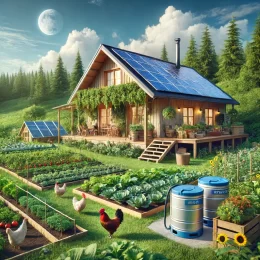
Living off-grid, while an appealing lifestyle for some, can be a significant commitment and may not be feasible for everyone. However, there are Alternatives To Full Off-the-Grid Life and enjoy a simpler, more self-reliant life. Here are some alternatives:
- Tiny House Living: Downsizing and living in a tiny house can help simplify your life. These compact homes often have a reduced environmental footprint and lower utility costs.
- Rural Homesteading: If going completely off-grid is too challenging, consider moving to a rural area and adopting a homesteading lifestyle. You can grow your own food, raise livestock, and live more sustainably while still having access to some modern amenities.
- Co-housing: Co-housing communities are designed for individuals who want to live in smaller, intentional communities. Residents share resources, responsibilities, and often have a strong sense of community.
- Remote Work: Many jobs can be done remotely, allowing you to live in a quieter, less populated area while still working in your chosen field. This is often referred to as “telecommuting” or “digital nomadism.”
- Seasonal Retreats: Some people choose to live part-time off-the-grid. They might have a primary residence in a city or suburban area and a seasonal retreat in a more remote location.
- Volunteer or Work Exchange Programs: There are opportunities to live and work in more isolated or rural areas in exchange for room and board. This allows you to experience a simpler life temporarily.
- Cabin or Cottage Living: Consider owning or renting a cabin or cottage in a remote area where you can escape the hustle and bustle of city life periodically.
- Homesteading Courses: If you’re interested in self-sufficiency but not ready for a full off-grid life, you can take courses in gardening, canning, animal husbandry, and other homesteading skills while living in a more urban or suburban environment.
- Retirement Communities: Some retirement communities focus on sustainable living and offer a balance between independence and community support.
- Minimalist Lifestyle: Embrace minimalism and simplify your life by decluttering, reducing your possessions, and cutting unnecessary expenses.
- Wilderness Camping: Spend extended periods in nature, camping or hiking in remote areas to disconnect from the noise and distractions of modern life.
- Mindful Living: Practice mindfulness and meditation to find simplicity and contentment in your current environment, even if it’s in a city or suburb.
Remember that the degree to which you disconnect from society can vary widely, and you can choose the level of simplicity that best suits your goals and circumstances. It’s essential to carefully consider your priorities, resources, and personal preferences when exploring these alternatives to off-the-grid living.
